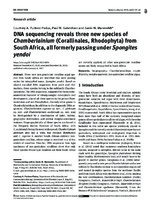| dc.contributor.author | Henkel, R | |
| dc.contributor.author | Panner Selvam, M.K | |
| dc.contributor.author | Baskaran, S | |
| dc.date.accessioned | 2021-05-24T09:41:00Z | |
| dc.date.available | 2021-05-24T09:41:00Z | |
| dc.date.issued | 2021 | |
| dc.identifier.citation | Henkel,R. et al. (2021). Protein profiling in unlocking the basis of varicocele-associated infertility. Andrologia, 53(1),e13645 | en_US |
| dc.identifier.issn | 0303-4569 | |
| dc.identifier.uri | 10.1111/and.13645 | |
| dc.identifier.uri | http://hdl.handle.net/10566/6187 | |
| dc.description.abstract | Varicocele is one of the major causes of male infertility and has a negative impact on spermatogenesis. The conventional semen analysis does not reveal the underlying subcellular mechanisms associated with defects in spermatozoa. Proteomics and bioinformatics analysis can be used to identify the molecular aetiologies associated with poor semen quality in varicocele patients. Mitochondrial dysfunction has been identified as the main factor affecting normal physiological functions of spermatozoa. This article discusses the proteomic studies of spermatozoa and seminal plasma in varicocele patients. Proteomics can identify potential spermatozoa and seminal plasma biomarkers in varicocele-mediated male infertility. In future, these protein biomarkers can be useful in the development of noninvasive diagnostic and therapeutic strategies for varicocele patients. | en_US |
| dc.language.iso | en | en_US |
| dc.publisher | Blackwell Publishing Ltd | en_US |
| dc.subject | Bioinformatics | en_US |
| dc.subject | Proteomics | en_US |
| dc.subject | Seminal plasma | en_US |
| dc.subject | Spermatozoa | en_US |
| dc.subject | Varicocele | en_US |
| dc.title | Protein profiling in unlocking the basis of varicocele-associated infertility | en_US |
| dc.type | Article | en_US |

